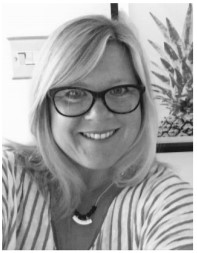Caroline Norrie and Nicole Steils are researchers at the Social Care Workforce Research Unit (SCWRU), King’s College London. (618 words)
The identity of Approved Mental Health Professionals (AMHPs) was the subject of a joint SCWRU and Making Research Count seminar held on Thursday, 23 August 2018, at King’s College London (KCL) as part of the Contemporary Issues in Mental Health series.

Dr Caroline Leah
The presenter, Dr Caroline Leah, Senior Lecturer at the Faculty of Health, Psychology and Social Care at Manchester Metropolitan University, discussed findings from her recently completed PhD about the role and identity of AMHPs, as well as enabling the audience, many being practising AMHPs, the chance to participate in lively discussions throughout the seminar.
An AMHP is a professional who is authorised to make certain legal decisions and applications under the Mental Health Act 1983; their powers include sectioning service users. This professional will usually be a social worker, who has undertaken additional training. In 2007, however, the law was amended to allow other mental health professionals to train for and to undertake this role. It is therefore now possible for psychiatric nurses, occupational therapists or psychologists to qualify as AMHPs, although this is still unusual.
Caroline reported findings from a qualitative, case-study project which involved in-depth interviews with ten AMHPs from three regions in the North West. Study participants’ identities were compared across qualifying professions (social work, nurse and occupational therapy backgrounds) as well as rural, urban and mixed rural/urban locations. Caroline found AMHPs to have developed ‘hybrid professional identities’ due to their ‘liminal’ (being at the interface) position where they typically work with a wide range of professionals, for example the police, ambulance staff and hospital bed managers, yet their role is often poorly understood by colleagues.
Her study explored how the AMHP professional role is negotiated between the employing organisation’s culture (local authority or NHS Trust) and within working relationships amongst other professionals in the Mental Health Act context. Caroline argued that AMHP work that encompasses working across legal, therapeutic, social work and management domains demands a ‘hybrid identity’ to enable working with other professionals to achieve positive outcomes for service users.
In her research, Caroline used sociological interpretations of the terms ‘a fool’s errand’, and the ‘cloak of conformity’ to capture reported working situations where AMHPs, on the one hand, are charged with championing service users’ decisions about how best to treat their conditions using the ‘least restrictive option’, however, on the other hand, due to austerity and the reduction of community services, it is difficult to offer service users any community-based options. Caroline coined the term ‘ironic dialogism’, which she used as a concept to explain the protective ironic approach practitioners may adopt when being faced with the disjuncture between the experienced realities of the AMHP role and tensions of working with a broken ‘rule book’.
Caroline asked the audience if this description of working practice reflected their own experiences and she received whole-hearted agreement that this was the current state of play. The audience discussed their day-to-day working conditions: identifying vacant ‘beds’ for service users and why this had become central to their role; waiting times for ambulances; filling in forms that did not seem to make sense; personal safety and lone working; and feeling voiceless in complaining about their situation. Only one seminar participant reported that there was not a bed shortage in their region. Participants also addressed whether having AMHP hubs or co-located workers situated with police was most helpful.
Caroline ended the talk with a ‘call to arms’ for AMHPs attending the seminar to do at least one thing to support the profession and raise awareness among those with decision-making powers about current practice and how it could be improved.
Dr Leah was talking at the Contemporary Issues in Mental Health seminar series.